Cult of Karaoke
Ten things you should know about Eugene’s karaoke scene
by Rick Levin
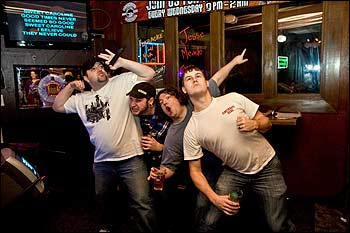 |
| DJ Nick Pantle, left, gives Neil Diamond a run for his money at Cornucopia’s Wednesday night karaoke fest. Photo by Todd Cooper. |
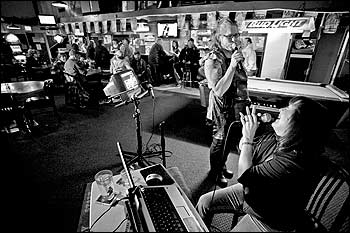 |
| Sassy Patty Richardson, right, cues up another tune during The Tankard’s weekly karaoke night. Photo by Trask Bedortha. |
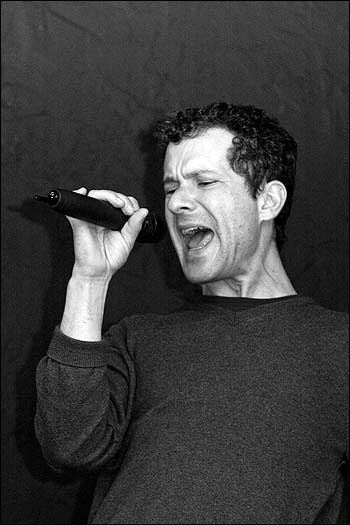 |
| Some asshole sings “American Girl” during Saturday night karaoke at the Red Lion Lounge on Coburg Road. Photo by Todd Cooper. |
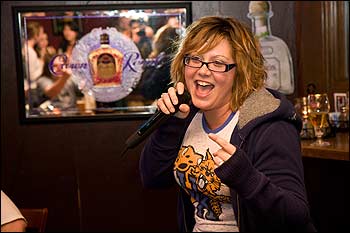 |
| Girls just want to have fun at Cornucopia’s karaoke night. Photo by Todd Cooper. |
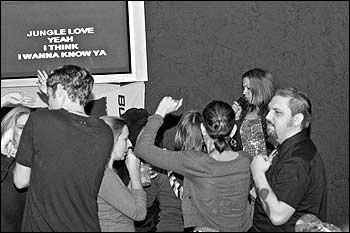 |
| Oh wee oh wee oh Red Lion’s lounge reels with “Jungle Love”. Photo by Todd Cooper. |
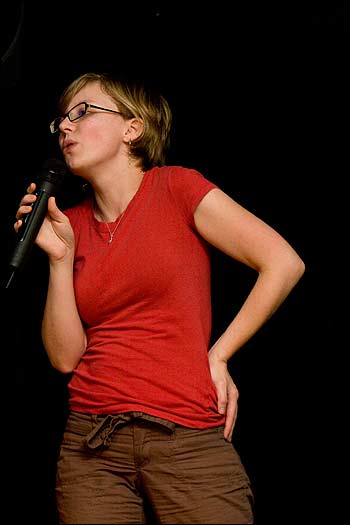 |
| Singing sweet melodies at Red Lion. Photo by Todd Cooper. |
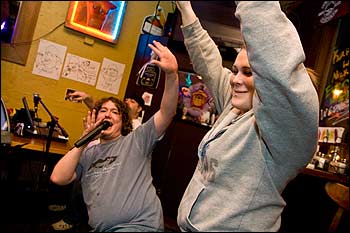 |
| No turntables and a microphone — cutting loose at The Corn. Photo by Todd Cooper. |
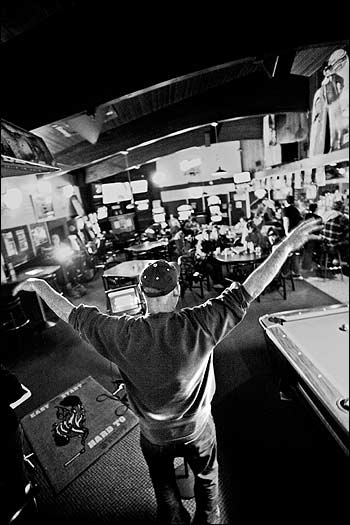 |
| Baby, you’re a star -— all the world’s a stage at The Tankard’s Thursday night karaoke party. Photo by Trask Bedortha. |
1 This is the saddest song I have ever heard. Sad not in the way, say, Ford Maddox Ford’s novel The Good Soldier is sad — tragically, poetically sad — but sad like a half-wilted birthday balloon is sad, trembling in the corner of the kitchen all red and puckered, the party long past.
The sad song I’m talking about is not any one song. It is every song that’s been hole-punched into that big binder, every song that’s been dismantled, chewed up and spit back out with a single element missing, like a musical cipher. In its earlier incarnations, the song was called “minus-one music,” a haunting phrase conjuring widowers waltzing alone at midnight. Still, I hear the song and feel the undeniable siren’s call to attach myself.
By its nature, the song can be “Billie Jean” or “It’s the End of the World as We Know It (and I Feel Fine)” or “Blue Eyes Cryin’ in the Rain.” Doesn’t matter. Its most common incarnation is as a duet called “Picture.” Numerous times I’ve heard it assume the form of “Me & Bobby McGee” or “Sweet Caroline,” but never “Take the Skinheads Bowling.”
The “song” I’m talking about is karaoke, an etymological mash-up of two Japanese words equaling “empty orchestra.” I have pursued this orchestra into the bars and taverns where it blossoms up like a full-moon flower, thriving on vodka tonics and fertilized by that abandonment of inhibition you see in rioters and sugar-shot kids. I have witnessed Warhol’s proverbial 15 minutes of fame made real, sort of, and I have thought: This is the American Dream and democracy in action at the grass-roots level of beer and barstools and booming voices.
And then I’ve thought: This is the decline and fall of Western civilization, a degradation of art and the latest twist on the timeworn Hollywood lie lulling small-town kids to Sunset Boulevard with fantasies of stardom only to crush their spirits and turn them into junkies and whores. This is Milli Vanilli suicide by way of American Idol.
But seriously, why poop on the party? Here are some of the more upbeat reasons folks offered for why they do the karaoke thing:
“You’ve got your four minutes of fame.”
“If you suck, so what? You don’t have to be good to do it.”
“It’s something to do.”
“What could I lose?”
“I always tell people the second time is better.”
So there you have it. Karaoke is a way to dust yourself in celebrity glitter, and it’s also just a good time, the newest incarnation of late-night, lampshade-on-the-head, dancing-on-the-table partying in public. It happens to be a totally brilliant business invention, too, a boon to bars looking to capture a crowd without charging covers or paying for full bands. It is capitalism as catharsis and the deliverance of instant gratification. It’s Gatsby’s green light flowing across the lyrics of “Folsom Prison Blues.”
2 So let us now praise some famous “karaoke sluts,” or at least one well-known ingénue of the empty orchestra. Her name is Patty Richardson, alternately known as DJ Patty or, my favorite, Sassy Patty. Believe me, the nickname suits her. Sassy Patty’s in-your-face attitude can come across as unswervingly aggressive until you catch the heart and humor lurking beneath her biker-tough exterior. She might be sassy, but she’s pretty sweet, too.
“I didn’t want to do it,” Richardson says of the day, more than a decade ago, when someone suggested she become a karaoke DJ. Until then, she’d been a hard-core adherent to the karaoke way of life as a singer. Richardson’s zeal for karaoke, she says, pushed her to wild levels of participation. Sometime in 1993, for example, she set a personal best by singing nine songs, at seven different bars, in a single evening. “I mapped it out,” she says, laughing.
Richardson, who studied special education and music performance at UO, says that her unique combination of training, experience and temperament make her a good karaoke host, despite her initial reluctance to make a career of it. “I’m an afterthought who was drug into it and succeeded,” she says. According to Richardson, she can fill a room in half an hour with a text message. “I’m a pusher,” she jokes. “You can’t expect karaoke to survive unless you build a clientele. Advertising is key.”
As a member of DJs-B-Us, Richardson is clear about her karaoke priorities. “I’m there for the owner of the bar,” she says. “That’s my job, is to make him money.” And when it comes to her patrons, she’s developed a sort of philosophy of karaoke — a psychological acumen that helps her help bashful or nervous singers. Richardson describes her approach as gentle, trusting, humorous and in-charge. “I tend to take control when they’re freaking out,” she says. “I try to make it as simple as possible. I have a good bedside manner.”
Contrary to appearances, standing in for the empty orchestra is no cakewalk. “Karaoke’s tricky,” Richardson says. “You can’t expect to be perfect the first time.” The hardest part is talking someone into it, she says. Once that’s been accomplished, Richardson has a handful of hints for the uninitiated, such as: Pick songs you know and like, smile (“It keeps you from going flat”), hold the microphone about two inches from your mouth and sing directly into it, remember to breathe and, somewhat counter-intuitively, keep your chin down, which opens up the airways, she explains.
DJ Nick Pantle of Caught-in-the-Act entertainment has been a full-time karaoke DJ for about 10 years. A Eugene native who served nearly six years in the Army, Pantle has that mixture of confidence, calm and quiet humor you sometimes find in vets, a sort of Zen demeanor that doesn’t sweat the small stuff. Sitting behind his laptop during karaoke gigs, he is simultaneously sociable and efficient, laid back and vigilant. Karaoke DJs require “a lot of patience,” Pantle says.
Having worked as a bouncer, Pantle considers himself a natural at both reading crowds and de-escalating alcohol-inspired disruptions. As a rule, he arrives at venues an hour early, giving himself time to set up, mingle and glean such demographic details as the density and general age level of the crowd as well as more intangible things like style of dress, which can provide clues about music preference.
This makes it easier for Pantle to give people what they want. “My thing is,” he says, “I like making somebody feel good up there. I give them the opportunity to have their three to five minutes of fame.” He usually sings the first song himself, partly to run a sound check. But belting out a tune, he says, also puts folks at ease. As a student at LCC, Pantle took a class on dance, singing, theater — basically “all the aspects of being a performer” — and for his final project he sang Elvis Presley’s “Can’t Help Falling in Love.” Pantle says, given an audition, that’s the song he’d sing for American Idol.
3 Crowds scare me, and the prospect of public performance makes the pre-vomit saliva start flowing in the back of my gullet. I’m not sure if Tom Petty has ever experienced similar fears, but if he has, it doesn’t show. To all appearances, the guy really likes playing his music in front of thousands of people. Tom Petty rocks. So I figured some of that Petty chutzpah might transfer vicariously to me if I sang “American Girl.” This is exactly the sort of voodoo thinking that makes air guitar the universal language of male longing.
To anyone present at the Red Lion lounge on Coburg Road, roughly between the hours of 10 pm and 2 am on Saturday, Jan. 16: I’m sorry. I’d also like to extend an apology to Tom Petty, in absentia, as well as offering a heartfelt mea culpa to the entire history and spirit of rock-and-roll and, by extension, popular music and the arts in general, all of which I desecrated with drunken impunity. Just because you’re handed a microphone doesn’t mean you have the right to sing.
4 At the more uplifting end of the karaoke spectrum is the story of Eugene native Mark Callahan, who sang Billy Idol’s “White Wedding” the same night I butchered Tom Petty. Callahan, a graduate of Sheldon High School and OSU, is in his early 30s, married, with two young daughters. What makes him remarkable, and perhaps unique, as a karaoke singer is that he flies completely solo — meaning that, instead of making karaoke a social outing, Callahan chooses to go to the bar alone, stay sober as a jaybird and sing as many songs as he can get in.
Callahan says he was introverted as a kid, and though he outgrew his shyness in college, he doesn’t consider himself an exhibitionist. In fact, his Saturday night outings provide him with a means of overcoming, via karaoke, any lingering social anxieties. “This has actually really helped me to build up my confidence. I actually used to have a kind of nervousness talking in front of people,” he says.
“I think I just want to be more open,” says Callahan, noting that he usually feels pretty good upon finishing a song. “It’s almost like coming down off some kind of high. It’s almost like pure joy.”
And here’s the corker: Callahan recently tossed his hat in the ring for Lane County Commissioner, vying in the District 2 slot being vacated in November by Bill Dwyer. Callahan considers entering politics to be a natural evolution of his upbringing in the Boy Scouts, an organization that acted “like a surrogate father” after his parents divorced. The Scouts, he says, proved that making a difference in people’s lives is both desirable and possible.
Is it too much of a stretch to conclude that, for Callahan, the challenge of singing karaoke gave rise to a desire for political office? Why not? Just as Kennedy’s cathode-charismatic crushing of a perplexed, pasty-faced Nixon during the 1960 presidential debate ushered in the era of televised politics, could Callahan be a harbinger — our first karaoke commissioner?
“The main reason I do [karaoke] is to be up in front of people,” Callahan says. “If I can combine that confidence with my desire to help people, I think that’s going to work out good for me.”
5 Aside from the sentimental goad of nostalgia compelling people to sing the songs they sing, I’ve noticed at least three major themes in karaoke song selection: gender and/or personal identity (“These Boots Were Made For Walkin’”); a kind of smirking, over-the-top sexuality (“The Pussycat Song”); and, finally, class politics (“Redneck Woman”).
6 And in the diagnostic lexicon of alcohol abuse, I’d like to propose the addition of a brand-new and long-overdue term, to be inserted somewhere between “hitting bottom” and “making amends.” The term is “karaoke hangover,” and its symptoms are similar to the remorse, regret and pained half-memories that follow any night of overindulgence, with the minor fillip that instead of asking, “What did I do?” or “Who did I sleep with?” the karaoke-hangover sufferer asks: “What did I sing?”
Like love-and-marriage or crime-and-punishment, alcohol and karaoke are inextricably intertwined. “Liquid courage,” as DJ Nick Pantle called it during a Wednesday gig at Cornucopia, is a crucial ingredient of many, if not most, karaoke performances. If you don’t believe me, just go to YouTube and type the words “karaoke” and “drunk” or “disaster” or “funny.”
It’s no secret that booze often serves as a social lubricant and means of self-medicating anxieties during awkward occasions like wedding receptions and first dates. With karaoke, however, this connection is more functionally explicit. Drink is to karaoke as catnip is to kitty. Sassy Patty Richardson says, when it comes to karaoke, “Alcohol doesn’t hurt.”
But not hurting and actually helping are two different things. Is there in fact therapeutic value in singing karaoke? Could it be some kind of exotic mating call? Michael Wehr, an assistant professor of psychology at the UO’s Institute of Neuroscience, says there doesn’t appear to be much science on karaoke as a psychological or behavioral phenomenon. “I’ve always thought that the reason people enjoy karaoke is that they’re channeling their inner rock star, rather than engaging in a mating display,” Wehr says. “Performing in front of an audience is a real charge.”
Among the few studies he found, Wehr pointed to one that tried “karaoke therapy” for schizophrenia patients, “but it didn’t help much better than regular singing,” he says, and in some cases it actually made the patients’ anxiety worse. Another study, Wehr said, “looked at patients with frontal-lobe degeneration, and found that they don’t get embarrassed like normal people do when doing karaoke.”
As the old song says: I’d rather have a bottle in front of me than a frontal lobotomy.
7 It occurs to me that how you feel about American Idol’s Simon Cowell could be a good barometer of how you feel about karaoke. If you despise the blunt, unsentimental way Cowell can shatter the hopes of less talented contestants, you are likely a fan of karaoke, where the talented and untalented alike are encouraged and applauded. If, however, Cowell’s straight-shooting assessments strike you as the perfect corrective in a society where everybody thinks she’s the next Britney Spears, you probably think karaoke is one gigantic jerk-off that demolishes creative standards and makes the whole world a wash of mediocrity. Does our unconditional acceptance of every asshole’s creative offerings signal the best of democracy, or does it sound the alarm on a world gone Hollywood haywire?
8 Similar to the bouncing ball utilized by Mitch Miller in his ‘60s television show Sing Along With Mitch — where the ball hopped happily at the bottom of the screen, landing on the appropriate lyric — the pace of a karaoke song is usually color coded, with the words changing hues at the precise moment they should be vocalized. Often the colors go from yellow to red, which gives the impression that the lyrics are filling with blood; when this is reversed, the song looks like it’s bleeding out.
9 On any given night in the greater Eugene area, there are at least four places where you can go to sing karaoke; on weekends, that number quadruples. Each venue has its own particular atmosphere and regular clientele, ranging from the inebriated and collegiate to the hipper-than-thou and retro-cool, to the Rat Pack confidential to the solidly countrified to the devoutly metal-headed and everything in between. Despite the egalitarian ethos that underpins karaoke participation, talent levels do vary from place to place, night to night and person to person. You can find yourself suddenly and unexpectedly blown away by someone you’d pegged, incorrectly, as a tone-deaf tosser. As DJ Patty Richardson warns: “You never prejudge people.”
By far the best time I had was at Richardson’s Thursday night karaoke at The Tankard in Junction City. The bar, a nondescript and windowless cement block butted up against Highway 99, turned out to be a 100-percent irony-free treasure trove of unassuming, genuine talent and colorful character, from the tall, mustachioed guy in the AC/DC shirt who nailed Led Zeppelin’s “Immigrant Song” to the woman in a dishwasher’s smock who sang a song so filthy it made me cover my face. At times, the night gave off a distinctly David Lynch-like aura of delightful weirdness, and I half expected to see the Log Lady amble in and belt out “Strange Fruit.” If life is a restless searching for a place of one’s own, then this was my place, and these were my people. The folks at The Tankard know how to enjoy their karaoke.
10 “Karaoke, it should be an open sport,” says Richardson, who will be hosting a pair of karaoke contests, one starting Feb. 18 at the Tankard, the other March 30 at Taylor’s. For Richardson, the people who flock to karaoke form a community, one that she struggles to keep cohesive and financially viable by supporting the industry as a whole. “I’m probably one of the few people who feels that way,” she says, explaining that, unlike some karaoke outfits, she takes a collaborative as opposed to a competitive approach, which includes recommending other karaoke companies when she can’t make it.
“We have a karaoke Mecca around here,” Richardson says of Eugene. “This is karaoke heaven.” She credits Dan Henson’s efforts in the early ‘90s with sowing the seeds of the present karaoke scene. Henson, a longstanding member of Eugene’s music community, died Dec. 13 at the age of 58. The loss was clearly a blow to Richardson, though she says Henson’s legacy inspires her to keep karaoke vital.
Nick Pantle, who also praises Henson’s efforts, says karaoke is no flash in the pan, fated to fade away like last year’s model. “As long as there are people who enjoy other people’s songs, I’ll have a job,” he says. “Karaoke is here to stay.”
As for the karaoke haters out there, Pantle has a simple suggestion. “You don’t have to do it,” he says. “To each his own. I’m sure there are bands out there you wouldn’t go see in concert, either, but they’re still doing what they do.”